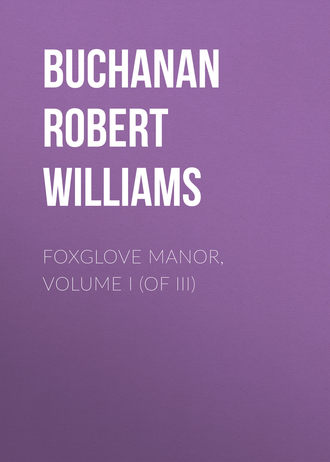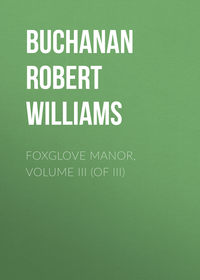
Foxglove Manor, Volume I (of III)
The newness of what was so familiar excited an indefinable interest in him. He felt somehow as though he had passed through the valley of the shadow, and this was the day after death – that death by which we shall not all die, but by which we and all things shall be changed. He lingered in that mental state in which thought expands beyond the bounds of consciousness, and it was not till a low, faint flush of red began to colour the east that he returned to the Vicarage, and, throwing himself on his bed, fell into the deep, dreamless sleep of exhaustion.
It was fortunate for Mr. Santley that he had inherited a magnificent constitution, or the consequences of this wild conflict might have been disastrous. He woke late, but the brief period of rest and unconsciousness had repaired the reckless waste of nervous force. Only a profound sadness remained as a testimony of the terrible nature of the emotion he had endured. The rest of the week passed in a sort of weary, listless stupor and the same heavy sadness. When Sunday came round, he shuddered as he ascended the pulpit at the recollection of that phantasmal audience to which he had last preached; but his intellect was clear and sane, and he kept faithfully to the written discourse spread out before him. He was not surprised that Mrs. Haldane left before he had any opportunity of speaking to her.
He had half expected as much. She regarded him with a cold, haughty contempt – a contempt too passionless to permit her even to avenge the insult he had offered her by exposing him to his parishioners. She knew he loved her – and indeed was not this folly proof of the frantic character of his love? – and she knew that total loss of her would be the greatest chastisement even vindictiveness could wish to inflict upon him. It would have been possible for him, he thought, to bear in silence any punishment from her except this icy contempt and utter indifference. If she had hated him, if she had pursued him with bitter hostility, if she had disgraced him, he could have endured it; it would have been no more than he merited. But that she should simply ignore him, that she should not consider it worth her while even to be angry, was an intolerable humiliation.
In spite of all, he still loved her! It was useless to seek to delude himself into any belief to the contrary. He loved her, in defiance of honour, goodness; in spite of misery and shame; in spite of divine or human law; in spite of man or God. He loved her with a mad, despairing passion, which he might conceal from all eyes for a little while, but which he could never quell; which he felt would some day break out in a frantic paroxysm that would involve both him and her in a common ruin. Home, position, reputation, this life and the next – he could sacrifice all for her. He could not exist without her. To see her and be never seen by her was a living hell. If he were, indeed, to be for ever doomed to this misery, better that he should perish at once, and have done for ever with the torture of being.
This alternative presented itself to the vicar not merely as one of those exaggerated expressions of feeling common to many men in moments of unendurable pain or depression, but as a sober reality. An existence in which Mrs. Haldane took no part and shared no interest was literally to him an existence more hateful than self-destruction itself. On the Monday he proceeded to the neighbouring market town, and bought a revolver and a packet of cartridges. He loaded the weapon on the road, and threw the remaining cartridges away. That evening he spent in looking over his papers, a large number of which he burned. He then sat down, and wrote for some time; but when he had finished, he threw what he had written into the fire. What need was there to put any explanation on record? He then took from the bookcase the great poem of Lucretius, and read till a late hour.
Next morning he arose early, and seemed in better spirits than he had been for some time. He told his sister that he was going to walk over to Foxglove Manor, and was not certain as to when he would return. He left the house, humming a tune, and set out at a brisk pace through the village. The weather was bright and inspiriting. The country never before seemed so full of health and gladness and joyous life. The lark was singing far up in the shining blue sky; butterflies went fluttering across the road; whirring flights of birds along the hedgerows preceded him all the way. He looked at everything and noticed everything – the bright flowers growing among the wayside weeds; the snail which had crept on to the footpath, and whose shell he carefully avoided. He observed too much to think; but one thought, underlying this discursive activity of mind, kept him company all the while – “I have struggled and prayed; I have tried to believe and to trust; I can do no more. If there be a God who is concerned in man, let him now give evidence of His providence.”
When he reached the Manor, he was ushered into the reception-room, where he was not kept long waiting. Mrs. Haldane entered the apartment, and received him with a chilling courtesy. She noticed that, though he had advanced eagerly at her entrance, he had not offered her his hand; and now that she had bowed to him with a certain constrained grace, he stood regarding her hesitatingly.
“I have come,” he said at last, in a low, nervous voice, “to throw myself on your mercy, to beg your forgiveness, to ask you once more to restore me your confidence and friendship.”
“I freely forgive you, Mr. Santley,” she replied at once. “It is better that what has taken place should be forgiven and forgotten as speedily as possible. But my confidence and friendship! How can I trust you any more? And I did trust and esteem you so much. I regarded you – But I will not even reproach you with having destroyed my idealization of you.”
“Reproach me and censure me as you will,” he cried earnestly; “but do not cast me away from you, do not be heartlessly indifferent to me. It lies in your hands to make my life happy or miserable. It depends on you whether I can live at all.”
“That cannot be,” replied Mrs. Haldane, shaking her head gravely.
“It is and must be,” said the vicar. “All my future, both here and hereafter, hangs on your decision now. I have fought with myself, and prayed to God to be delivered from my bondage; but it is in vain. No answer has been vouchsafed to my supplications; no grace, no strength has been granted in my need. Had I prayed to the deaf impersonal power which your husband believes in, I could not have been more hopelessly unheard or unheeded. The conflict is over. I am the gladiator fallen in the arena, and it rests with you to give the signal of reprieve or destruction.”
“I do not understand you, Mr. Santley,” she said, feeling alarmed and excited. “What do you ask? What would you have me do?”
“Oh, what would I have you do!” he exclaimed passionately; then, checking himself abruptly, he continued eagerly, “I would have you be as you were before I offended you. I would have you forgive my offence.”
“I have promised to forgive and forget it,” said Mrs. Haldane.
“No; do not forget it, but pardon it, and try to look upon it as more venial than you now do. Oh, Ellen, had I not loved you beyond all that a man values in this world, would it be possible to have so far fallen in your esteem?”
She frowned, and was about to interrupt him; but he went on hurriedly – “Do not be angry. I will not speak to you of love again. I will only answer your question. I would, as I have said, that you should forgive my offence, and be the same to me as though it had never happened. Not only my use in life, my happiness, my honour depend on this, but life itself. I cannot exist without some share in your thoughts, in your interests, in your regard. Life would be intolerable if you were to be wholly taken away from me. Do I ask too much? Answer me quickly, for I am prepared for either alternative. You and God – if, indeed, there be above us a God who sees and cares – must now decide my course.”
“You frighten and bewilder me with your passion. I do not know what to answer you. Indeed, I hardly know whether I understand you. I have forgiven you. I bear you no ill will. I hope, indeed, that you may be happy, and that you may soon find some one who will be worthier of your love than I could have been. I am both sorry and ashamed of what has happened, and I will try to forget it, both for your sake and my own. Have I not said enough?”
“And the future?” he asked, with an anxious look.
“‘The future will be a continuation of the past, seeing that all is forgiven and forgotten.”
“And you will still allow me to speak to you, to see you? You will not treat me with silence and indifference?”
“I will be as I used to be,” said Ellen, with a look of doubt and hesitation. “And you will trust me?”
“Are you to be trusted, Mr. Santley?” she asked in a low voice. “You know how fully I trusted you before.”
“And you must trust me again if all is to be the same as it was. Is not that our agreement?”
“I will try to, but the result will entirely depend upon yourself.”
“I cannot say how thankful and grateful I am to you,” he said, extending his hand.
She took it, and he raised hers to his lips, though she coloured and tried to withdraw it.
“Nay, it is but a token of my gratitude and submission. I am thankful to live, and you do not know how certainly you have enabled me to live.”
“My husband is in the laboratory,” said Mrs. Haldane, who felt uneasy, and wished to bring this interview to a close.
“Shall we join him?
“Certainly, if you wish it.”
They found Mr. Haldane busily engaged in writing, while the sinister-looking attendant, with the dark, startling eyes, was noiselessly occupied in filling a number of flasks with some mysterious decoction intended for immediate experiment.
“Ever busy!” exclaimed the vicar.
“Busier than ever just now,” replied Mr. Haldane. “I am preparing a paper which I intend to read on Tuesday next before the scientific congress at Paris.”
“Are you going to Paris?” asked Mr. Santley, with surprise, and addressing the question rather to Mrs. Haldane than her husband.
“Mr. Haldane is going, but I remain here.”
A look of relief passed over the vicar’s face.
“And what is the subject of your paper, if curiosity be pardonable?” he asked.
“Oh, it is a chapter from the great opus on morals. I call it ‘The Problem of Suicide.’ A singularly fascinating subject to one who has paid any attention to it, I assure you. Does it happen to have fallen in your line of study?”
“I cannot say it has.”
“You would find some curious generalizations here, in that case,” said Mr. Haldane, pointing to the sheets of paper on his desk. “For instance, I suppose you would be hardly prepared to grant that suicide, which seems a barbarous and unenlightened act, is really an effect of civilization, or that an act which appears more than any other an evidence of individual spontaneity, is in fact the inevitable issue of universal and absolute social law.”
“I am certainly not prepared to concede that.”
“No; few persons unacquainted with the subject would be. Still, the facts remain. The suicide who imagines he is rebelling against all law and asserting his individual independence, is but illustrating the coercion of the physical and psychical dispensation. Why, you shall not even choose your own weapon of destruction, or select the spot in which you shall die. Law will fix those apparently trivial details for you. If your suicide is an Englishman, for example, he will prefer hanging to cutting and stabbing, cutting and stabbing to drowning, drowning to poison, and poison to firearms. With English women the order of preference is modified. A third of the women, and hardly a seventh of the men, seek death by drowning; while a seventh of the women poison themselves, but only a fifteenth of the men. The ratios hold good from year to year – relatively at least – for suicide is largely on the increase. You should look into the matter for yourself. It is a most attractive social problem.”
“Perhaps Mr. Santley would like to look at your paper?” suggested Mrs. Haldane.
“You shall be very welcome to see it when I return,” said the philosopher.
“Thank you very much. I have no doubt it will be extremely interesting. And when do you leave?”
“The day after to-morrow. I shall spend a day or two in London, and possibly a week or a fortnight in Paris. Indeed, I have some notion of paying a flying visit to Berlin.”
That afternoon, as the vicar returned home, he paused by a pool in one of the fields that skirted the high-road, and flung his revolver into it.
“Can it be possible,” he asked himself, “that man has no volition, no independence of action; that his choice of life or death even is not a choice, but a predetermined issue of mechanical forces?” He watched the ripples die away on the water, and then resumed his way.
“Are we mere automata, accomplishing not our own wills, but the secret purpose of a subtle agency, of whose control we are unconscious?”
Gradually the problem which perplexed him gave place to another wave of thought. His step became firmer and more elastic, and his face brightened.
The thought which effected this change in his demeanour was Mr. Haldane’s departure. What might not happen in those few days of absence? Was not Mr. Haldane also accomplishing an unknown, destiny? Might not this journey be providential? Or say, rather an unanticipated road to the great end? Suppose Mr. Haldane should never return!
The possibilities involved in that reflection!
Then he thought of Mrs. Haldane. For a week, perhaps for a fortnight, she would be alone at the Manor. For a fortnight? Who could foretell – perhaps for ever!
END OF VOL. I



